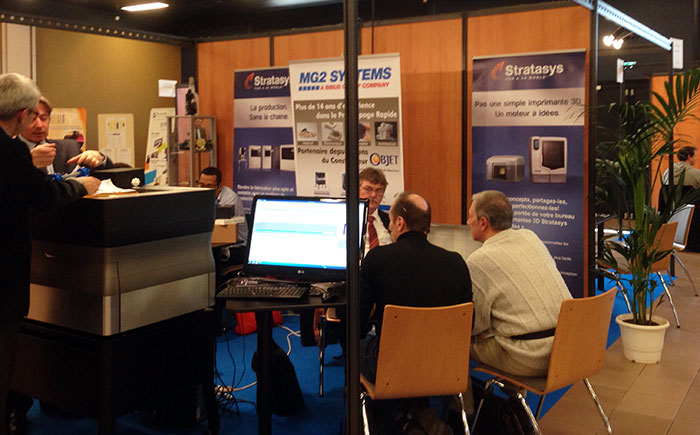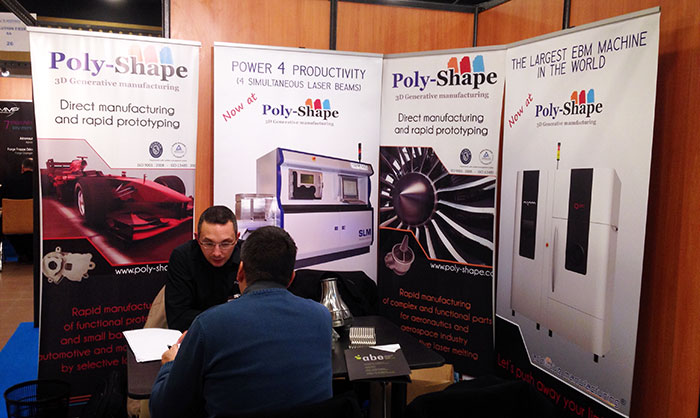While all the fun in the 3D printing industry is taking place at New York’s first 3D Print Show this week; in Lyon, France, 3D printing industrial adopters are also hard at work. The beautiful French city on the Rhône and Saône rivers, that will inaugurate its own 3D Print Exhibition next June, hosted the Advance Prototyping Solutions (APS) Meetings at L’Espace Tête d’Or earlier this week, right next to one of the largest botanical gardens in Europe, in a park by the same name.
This “little Paris”, often, like many other French cities, overshadowed by the French capital’s universal appeal, is rapidly becoming a Hub for 3D printing adoption and production. And rightfully so, since the city has a long standing tradition as a centre of excellence for the mechanical, textile, chemical and medical industries.
Advanced Business Events (ABE), a global organizer of trade shows and conferences for different branches of the manufacturing industry (from aerospace to material science and plastics), has created these business meetings and conferences — tightly scheduled over a period of two days — focused on the subject of rapid prototyping and the machines (3D printers) that make it possible. Their goal is to address the need of many French industrial decision makers and to help them figure out which additive manufacturing technologies may be right for them and how to implement them in their business.
“Everything turns around the principle of pre-selected and pre-organized one-to-one (or two-to-two) meetings,” says Denis Tirel of ABE. “On one side are the decision makers from different types of industrial manufacturers, including aerospace, automotive, clothing, textile, jewellery and sports equipment. They have a need to engage with suppliers of technologies, subcontractors and partners that can help them solve some of the issues they face. We prospect and recruit both, from our large database derived from the many different business conferences we organize. The basic idea is to offer each decision maker 20 to 30 potential suppliers to address a specific issue.”
The program of events includes both booth-based meetings and conferences with experts, both from the industrial and the academic sectors, touching on some of the most advanced aspects of rapid prototyping, from electron beam melting (EBM) to the science of advanced materials.
“What participating companies are looking for is innovators,” adds Tirel. “We have invited speakers form institutions such as CTIF (France’s Center for Foundry Technologies) and IFTS (Institute for Filtration and Techniques of Separation) to discuss aspects such as weight reduction and dense, void-free additive manufacturing. But we also had Eric Bredin, marketing director EMEA from Stratasys, talk about their newest multi-material photopolymer technology.”
APS is now in its second year and, although the number of exhibitors has been lowered, leaving out software companies to focus more on machine suppliers, the number of companies attending has grown significantly — by over 30%, from 95 to 13 — in line with the general growth trend in the global additive manufacturing industry as a whole.
“If the rate of innovation were to slow down we might move to a two year cycle between shows but at the moment it does not seem likely. Even in difficult times for many global economies,” continued Tirel, “companies are more and more appreciative of the opportunity to build more products internally, reducing costs and moving on to small size series productions. Today it is becoming possible for even a small company to make more products with a reduced number of workers.”
This, however, does not mean less jobs, just more specialized ones. “Additive manufacturing technologies allow us to make more and better things so they create more work. Of course this means that people will need to be trained to learn how to use and develop these technologies and that is an aspect that governments and institutions should care deeply about.” So it all goes back to education, an area that Makerbot is focusing in on heavily with its projects in the US. Is somebody going to do the same in Europe as well?
Perhaps LeFabShop, Makerbot and M-Cor distributor and one of the reference companies for makers and consumer 3D printing in France. We met with business developer Philippe Kervizic, during the APS Meetings. “Supplying information and technologies for many educational institutions in France is one of our main areas of work, he told us.” Apparently it works: in only its first year of business the company has registered revenues for over 1.6 million euros. But growing a new generation of 3D students that have mastered 3D printing is likely to be worth a lot more.





